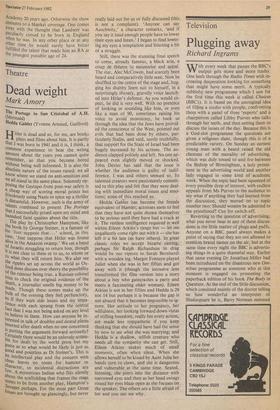Theatre
Dead weight
Mark Amory
The Portage to San Cristobal of A.H. (Mermaid) Hedda Gabler (Yvonne Arnaud, Guilford) Hitler is dead and so, for me, are books plays and films about him. It is partly that I was born in 1941 and it is, I think, a common experience to hear the wrong amount about the years you cannot quite remember, so that you become bored without being well informed. It is also the absolute nature of the issues raised: we all know where we stand on anti-semitism and we all stand in the same place. Solemnly op- Posing the Gestapo from post-war safety is a cheap way of scoring moral points but frivolously using Nazis to spice up a thriller is distasteful. However, such is the army of talents combined to present The Portage that I successfully prised open my mind and banished faint qualms about the title. The play by Christopher Hampton, like the book by George Steiner, is a fantasy of the `Just suppose that ...' school, in this case, 'Just suppose that Hitler was found alive in the Amazon swamp.' We see a band of Israelis struggling to return him, though It Is not clear to them or to us, to whom or to what they will return him. We also see the ripples set up across the world as Ox- ford dons discuss over sherry the possibility of the rumour being true, a Russian colonel tries to check the original evidence of the death, a journalist smells big money to be made. Though these scenes make up the bulk of the evening they feel perfunctory, as if they were side issues and my impa- tience with each sprang from the central fact that I was not being asked on any level to believe in them. How can anyone be in- terested in talk of doubles and dental plates inserted after death when no one concerned is Putting the argument forward seriously? Certainly there would be an unlovely scram- ble
for deals by the world press but my
guess as to what would be likely is just as good and pointless as Dr Steiner's. This is an intellectual play and the concern with ideas leaves no room for humour or character, so incidental distractions are few. A mysterious Indian who flits silently about the scaffolding that frames the stage seems to be from another play, Hampton's Sovages perhaps. For the most part Great Issues are brought up glancingly, but never
really laid out for us or fully discussed (this, is not a complaint). 'Anyone can say Auschwitz,' a character remarks, 'and if you say it loud enough people have to lower their eyes and listen.' I began to find lower- ing my eyes a temptation and listening a bit of a struggle.
Still, there was the stunning final speech to come, already famous, a black aria, a coup de theatre to mesmerise and appal.
The star, Alec McCowen, had scarcely been heard and comparatively little seen. Now he shuffled to the centre of the stage and, hug- ging his shabby linen suit to himself, in a surprisingly throaty, gravelly voice launch- ed into Hitler's defence. As you would ex- pect, he did it very well. With no pretence of looking or sounding like him, or even like a man of 90, sometimes raising his voice to avoid monotony, he took us through the idea that the Jews have provid- ed the conscience of the West, pointed out evils that had been done by others, par- ticularly Stalin, and said, surely truthfully, that support for the State of Israel had been hugely increased by his actions. The au- dience clapped politely and left. No one ap- peared even slightly moved or shocked.
John Dexter has said that the issue is whether the audience is guilty of indif- ference. I was and others seemed so. Its talented creators were passionately commit- ted to this play and felt that they were deal- ing with immediate moral issues and emo- tions; none-of this reached us.
Hedda Gabler has become the female equivalent of Hamlet; actresses seem to feel that they have not quite shown themselves to be serious until they have had a crack at it. The restless intelligence required is well within Eileen Atkins's range but — let me ungallantly come right out with it — she has left it a bit late (as have others). In great classic roles we accept bizarre casting, perhaps Sir Ralph Richardson in drag would be our riposte to Sarah Bernhardt with a wooden leg. Margot Fonteyn played Juliet when she was in her fifties and got away with it (though the intrusive lens transformed the film version into a story about a boy who gatecrashes a party and meets a fascinating older woman). Eileen Atkins is not in her fifties and Hedda is 29 not 14 but perhaps it is because the gap is not absurd that it becomes impossible to ig- nore. Her attitude to her pregnancy, her wilfulness, her looking forward down vistas of stifling boredom, really her every action, are made less sympathetic if you keep thinking that she should have had the sense by now to see what she was marrying; and Hedda is a shallow, selfish creature who needs all the sympathy she can get. Still, Eileen Atkins makes much of small moments, often when silent. When she allows herself to be kissed by Aunt Julia her hands turn to claws, and she is dangerous and vulnerable at the same time. Seated, listening, she peers into the distance with narrowed eyes and then as her head swings round her eyes blaze open as she focuses on the speaker. The others are a little afraid of her and you can see why.




































 Previous page
Previous page